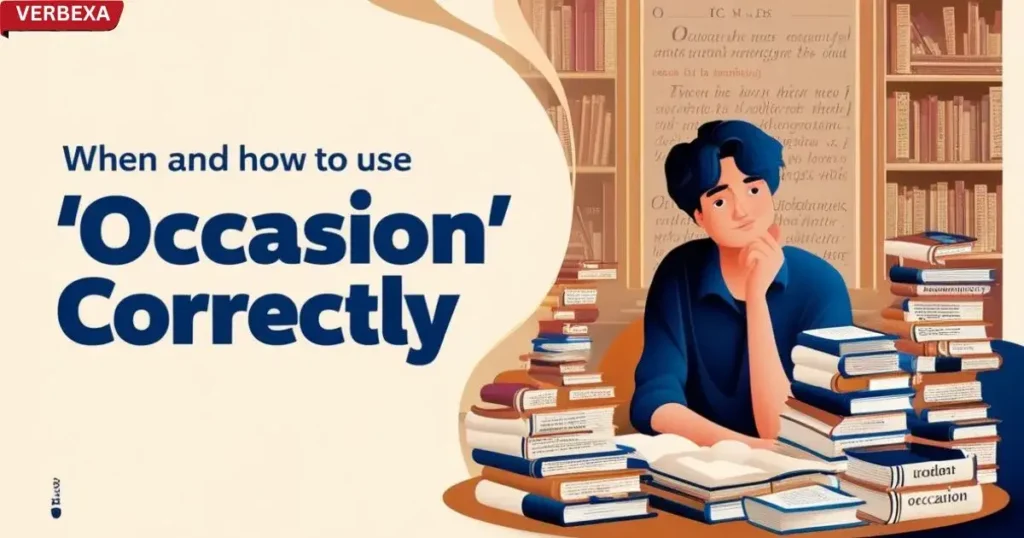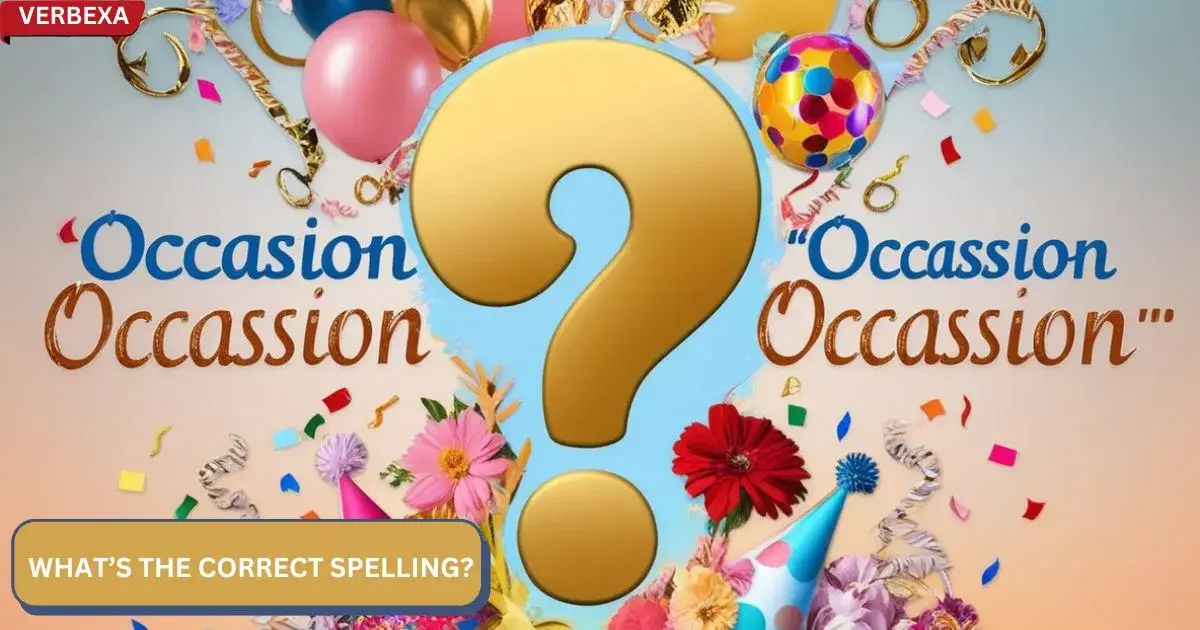It’s easy to stumble upon the misspelling of occasion, especially in the fast-paced world of digital communication. Many people write ocassion or occassion, unintentionally introducing a grammatical error into their writing. But the correct spelling is crucial, especially in formal contexts and professional writing. This article will delve into the correct spelling of occasion and help you understand why the other spellings are incorrect.
We will explore the differences between occasion and its misspellings, clarifying their usage and helping you write error-free writing. Imagine sending a formal invitation to a wedding and misspelling occasion – it could undermine the professionalism of the event. This article will provide you with the knowledge to avoid such errors and use the word occasion correctly in everyday situations and significant events.
Defining Occasion: A Linguistic Deep Dive

What Exactly is an Occasion?
An occasion is a particular event or happening that is significant or memorable. It can range from celebrations like weddings and birthdays to more formal ceremonies such as graduations or award ceremonies. The word encompasses both momentous events and regular occurrences that hold special meaning.
Semantic Definition:
- Meaning: A special time or event
- Part of Speech: Noun
- Etymology: Derived from Latin “occasio”, meaning opportunity or circumstance
Common Misspellings and Why They Happen
The most frequent misspellings include:
- ocassion (incorrect)
- occassion (incorrect)
- occasion (correct ✓)
Why do these errors occur? Context and typing speed often contribute to these spelling mistakes. The double “c” and single “s” can be particularly tricky for many writers.
Comparison Table: Spelling Variations
| Spelling | Validity | Usage | Professional Acceptance |
|---|---|---|---|
| occasion | Correct | Widely Used | Fully Accepted |
| ocassion | Incorrect | Not Recommended | Unacceptable |
| occassion | Incorrect | Avoid | Unprofessional |
When and How to Use “Occasion” Correctly

Formal Writing Guidelines
In professional writing, academic contexts, and business communication, always use the correct spelling: “occasion“.
Examples:
- The graduation ceremony was a memorable occasion.
- We prepared fine china for this special occasion.
- Her promotion was an occasion worth celebrating.
Practical Spelling Tips
- Remember the spelling rule: One “c”, One “s”
- Use spell check tools
- Practice writing the word multiple times
- Create a mental association with similar words like “location“
Everyday Usage and Context

Let’s illustrate the correct usage of occasion with some relatable examples that will stick with you.
- “My daughter’s graduation was a momentous occasion.” (Here, occasion signifies a significant event.)
- “We celebrated our anniversary with a small, intimate occasion.” (The word occasion refers to a special celebration.)
- “The annual company picnic is a fun and relaxing occasion.” (Here, occasion describes a regular event.)
- “They exchanged vows during a lovely occasion at the chapel.” (The word occasion indicates a special event, a wedding.)
- “Let’s not let a little rain ruin our celebration; it’s a special occasion after all!” (In this context, occasion signifies an important event.)
- “The holiday season is filled with many special occasions. (The occasions are holidays and celebrations.)
- “She wore her best china for the occasion.” (The occasion is a special gathering, requiring fine china.)
- “Many dignitaries attended the occasion.” (The occasion is a formal and important gathering.)
- “What’s the occasion for such an extravagant dinner?” (The occasion is the reason for the event.)
- “He purchased a new suit for the occasion.” (The occasion necessitates formal attire.)
- “I baked a cake for this special occasion.” (The occasion deserves a celebration cake.)
- “The birthday party was a joyful occasion.” (The occasion is a happy birthday celebration.)
These examples show the versatility of occasion in different situations. Note that these sentences would be incorrect if you substituted “ocassion” or “occassion” for “occasion.” The incorrect spellings would immediately signal a spelling mistake, damaging the credibility and impact of your message.
Common Mistakes to Avoid
Spelling Pitfalls:
- Don’t add extra consonants
- Maintain single “c” and “s”
- Be consistent in formal contexts
The Holiday Season: A Perfect Occasion Example
During the holiday season, people frequently use the word “occasion” to describe various celebrations. This period provides numerous opportunities to demonstrate correct spelling and word usage.
Final Spelling Checklist
- ✓ Occasion = Correct
- ✗ Ocassion = Incorrect
- ✗ Occassion = Incorrect
Mastering the spelling of “occasion” is more than a linguistic exercise—it’s about presenting yourself clearly, professionally, and confidently in every written interaction.
FAQ
Which one is correct, occasion or occassion?
“Occasion” is the correct spelling; “occassion” is a misspelling. Always use “occasion” for accurate and effective writing.
How do you spell occasion in America?
The spelling of “occasion” is the same in America as it is elsewhere: “occasion.”
What is the correctly Spelt word occasion?
The correctly spelled word is “occasion.” There are no alternative spellings.
How do you spell occasion in Oxford dictionary?
The Oxford dictionary, like all reputable dictionaries, lists “occasion” as the only correct spelling.
Conclusion: Mastering Occasion
The words ocassion and occassion are not real words; occasion is the correct spelling. Remember this simple rule to avoid common spelling errors and improve the clarity and professionalism of your written communication. The correct spelling of occasion is essential for error-free writing, regardless of the context. From everyday situations to formal contexts, using “occasion” correctly shows attention to detail and enhances the impact of your message. Mastering the correct spelling of occasion improves your writing significantly, making it more professional, polished, and impactful.
Avoid the misspellings ocassion and occassion – they are not part of the standard English vocabulary. The confusion between ocassion or occasion, and occassion or occasion is common, but easily avoided. Always use the correct spelling of occasion, occasion, to ensure accurate spelling, proper spelling, and enhance the overall quality of your written work. Accurate usage of words such as occasion is crucial for skilled writing and quality writing. When in doubt about occasion or occassion, always double-check. Always rely on a spell check to detect potential spelling mistakes and to ensure the correct word usage in your writing. Remember that in all cases, occasion is the correct spelling.

This author is a passionate linguist and grammar enthusiast, dedicated to helping individuals master the art of language. With years of experience in teaching and editing, she brings clarity and precision to every sentence. Tina’s mission is to empower writers of all levels to express themselves with confidence and excellence.

